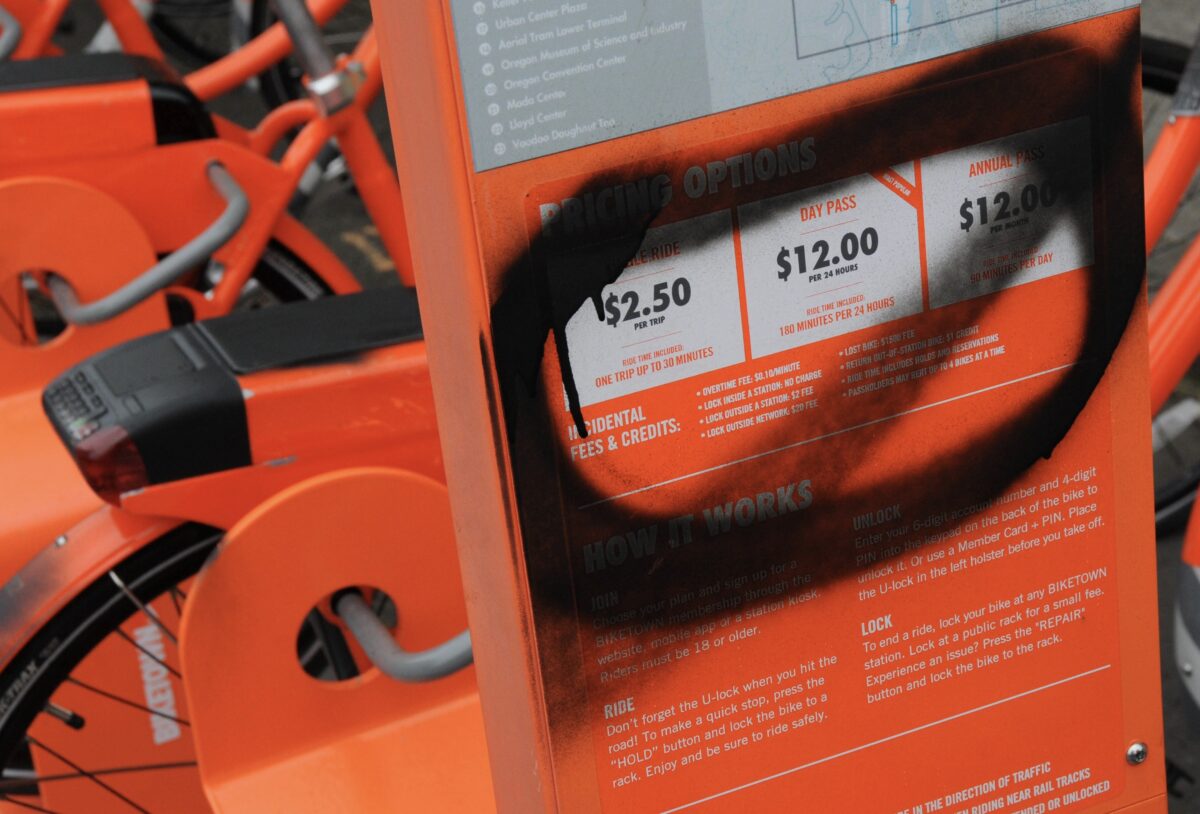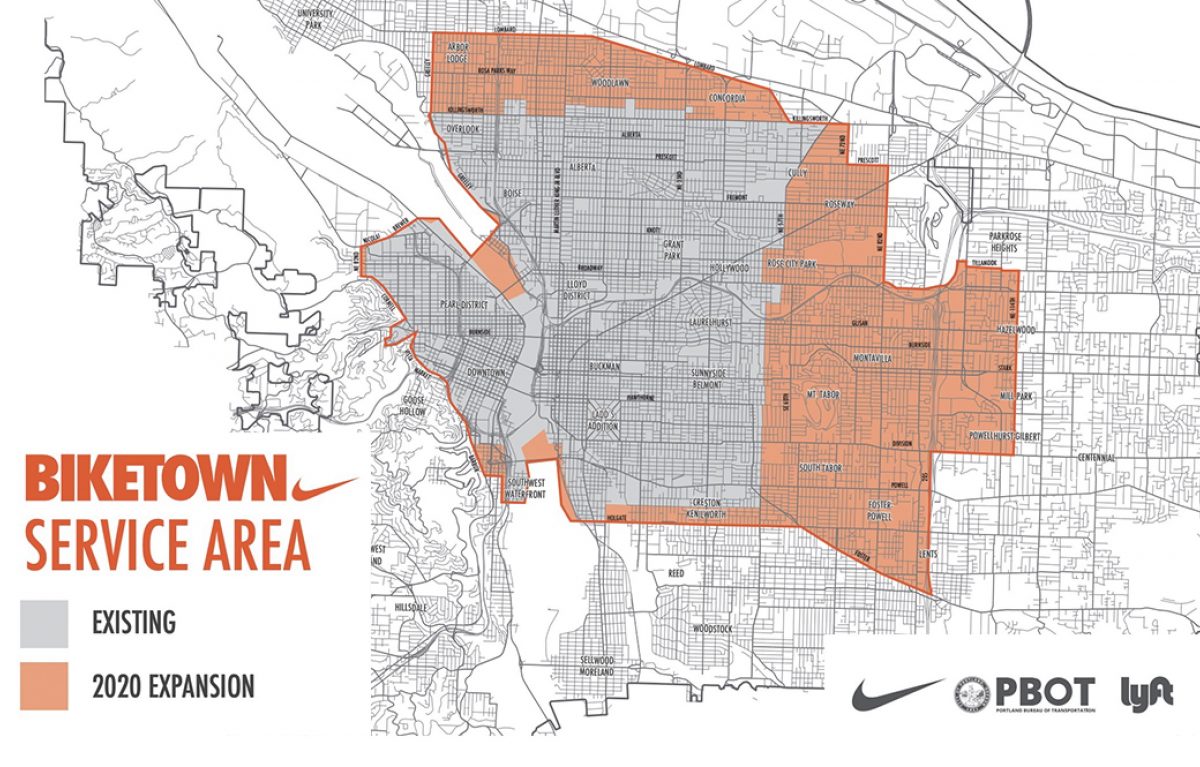
(Photo by J. Maus/BikePortland from vandalism incident in April 2017).
“Every trip now comes with a marginal cost. That’s a significant disincentive to using the system.”
— Iain Mackenzie
Amid the excitement around the City of Portland’s big bike share upgrade announced last week, one key detail deserves more scrutiny: The price to use the new electric Biketown bikes will be much higher.
City officials say it’ll be worth it, they’ll monitor usage impacts, and adjust pricing if necessary. Some existing users are disappointed and advocates say they weren’t consulted prior to the price increase and fear it could dampen enthusiasm and restrict access to the system.
Old versus new
Affordability and accessibility is a hallmark of the current bike share system. The Portland Bureau of Transportation (PBOT) offers a variety of plans, relatively low fees, and has been flexible and innovative in their pricing strategies since the system launched four years ago.
The current system has four basic pricing tiers: pay-as-you-go, month-to-month, Biketown For All, and an annual membership. Biketown 2.0 will no longer offer a monthly plan, so let’s look at the three remaining tiers.
Currently, users can become “Pay As You Go” members with a one-time, $5 sign-up fee. After that, rides cost $0.08 per minute. Come September, pay-as-you-goers will be billed $1 for every ride and then $0.20 for every minute. This is similar to how e-scooter billing works.
Biketown for All, the program for people with low incomes, is currently $3 a month and comes with 90 minutes of free ride time per month. That plan will go up to $5 month with zero free minutes and a cost of $0.05 per minute. PBOT says Lyft has agreed to give people 400 free minutes per month.
The popular annual membership is where most of the pain will be felt. The yearly plan is currently $99, comes with 90 minutes free, and costs $0.08 per minute after that. An infographic shared by PBOT last week said the annual pass would be $99, “Plus 10-cents per minute.” It didn’t mention there’d be no more free rides.
Advertisement
Portland bike advocate RJ Sheperd created a tool to compare new Biketown prices to the current system as well as TriMet, New York City’s Citibike system (which offers both regular (analog) and e-bikes) scooters, and cars. His model assumes two rides per day. I ran the tool based on 30 minutes of riding a day and 225 trips per year. The result? The new Biketown system would cost $774 per year, eight times the current system. That being said, that’s still cheaper than an annual TriMet pass ($1,125), on par with Citybike’s e-bikes, and much less than an equivalent amount of use on e-scooters ($2,407) or a private automobile ($8,558).
(*Please note caveats with this cost comparison data including: E-bike trips will be much shorter given the higher average speed, TriMet offers a range of annual passes that are cheaper than their standard fare (like youth fare, low-income, senior discounts, and no on), and car ownership costs of course vary widely.)

Analog BikeTown: $0.44
E-BikeTown: $3.44 (8 times the cost of Analog BikeTown)
TriMet: $5.00
Analog CitiBike: $0.80
Electric CitiBike: $3.75
Spin (E-Scooter): $10.70
Vehicle Ownership (w/o Parking Fees): $38.04
Analog BikeTown: $99.00
E-BikeTown: $774.00 (8 times the cost of Analog BikeTown)
TriMet: $1,125.00
Analog CitiBike: $179.00
Electric CitiBike: $844.00
Spin E-Scooters: $2,407.50
Vehicle Ownership (w/o Parking Fees): $8,558.00
Price up, priced out
Portlander Joe Hand has been a Biketown member since 2018. Or I should say, had been a member.
“Details like rates had to be negotiated to get the best deal for Portlanders. We get a larger service area and e-bikes, at no cost to taxpayers.”
— Dylan Rivera, PBOT
Hand figures he paid a total of $190 for three years of an annual membership (after discounts were taken for parking credits) because most of his trips would be under 90 minutes. “I loved bike share because of the flexibility it offered,” he shared recently. “I’d often walk to get coffee or lunch with my co-worker (we both work at home) and then could grab a bike, stop at the grocery store, and bike home.” The price increase made him rethink his membership. “I haven’t been using it lately but generally like the idea of supporting bike share, so I kept it. However, with the pricing change, I asked for and received a refund.”
Given his riding habits, Hand figures it might be smarter to just buy a new bike. “I’ve been thinking about getting an e-bike, so this may be the push I needed. Buying a new e-bike instead of bike share is a no brainer at that price.”
Biketown member Josh Hetrick has similar feelings. “This new cost structure really craters the usefulness of the entire system for short-ish trips,” he shared on the Bike Loud PDX email list. A self-described choice rider, Hetrick added that, “Previously it was filling a unique role where transit didn’t fit the trip well and the bike ride could easily be cheaper, but now the costs are much more comparable and its role is murkier… I’d like to be excited about the e-bikes and the service area expansion, but this is a big downside.”
Iain Mackenzie, an architect who pens the Next Portland blog and is also a member of the PBOT Bicycle Advisory Committee, is excited about the introduction of e-bikes. “But I’m very disappointed that it comes at the expense of traditional bikes and includes a large fare increase,” he shared with me recently.
“With the new fare structure, an annual member who uses the 90 minutes they previously had included in their membership will pay $9 — almost twice the price of a TriMet day pass,” Mackenzie said. “While most people probably use Biketown less than that, every trip now comes with a marginal cost. That’s a significant disincentive to using the system, and those costs will quickly add up for regular users.”
Advertisement
Mackenzie is also miffed that the Bicycle Advisory Committee (BAC) wasn’t asked for feedback on the new prices. “It is hard to imagine TriMet or the Portland Streetcar proposing such a large fare increase without any public consultation happening, but that is what happened. At no point in this process was the Bicycle Advisory Committee consulted, or even informed. This is a big change to a part of Portland’s transportation system and it shouldn’t be done so lightly.”
PBOT confirmed that the last time Biketown was on the BAC agenda was in 2018.
Why the increase?

When bike share was first pitched and passed, elected officials made an unfortunate promise: They would create this amazing new public transit system with zero public subsidy. Bike politics being what they were at the time, broad, mainstream support for shared rental bikes was so flimsy that adding funding form public coffers was thought to be an invitation for controversy.
So Portland launched a 1,000 bike system without any down payment of their own. Even the bikes themselves were purchased with a $2 million federal grant awarded by Metro in 2011. Then founding sponsor Nike stepped up with $10 million in sponsorship to get the system running. This time around the City of Portland won’t own the bikes.
This lack of skin in the game from PBOT gave contract partner Lyft (which owns Biketown operator Motivate) leverage in negotiations. When asked for her view on Biketown’s new pricing structure, Tarani Duncan, a consultant and former product engineer at Uber and Lyft, said, “The biggest issue with bike share schemas is the lack of public subsidy that would enable operators to bring prices down.”
When asked to respond to price increase concerns, PBOT spokesperson Dylan Rivera said, “The cost of operating an e-bike system is higher, but we think it will be worth it.” He said feedback from the bike committee in 2018 and City Council last April made it clear they not only needed an e-bike fleet, but that it had to reach more Portlanders (which makes it even more expensive to operate). “We heard loud and clear from Council that service to east Portland, creating a good experience for people new to biking, and providing a high-quality e-bike experience were all high priorities,” Rivera said as justification for the higher prices.
“Details like rates had to be negotiated to get the best deal for Portlanders. We get a larger service area and e-bikes,” Rivera said. “At no cost to taxpayers.”
Rivera thinks once people throw a leg over the new e-bike, they’ll forget about the higher price. “These bikes will help more people reach more places, faster and easier,” he said. “People who are new to biking will find themselves biking farther than they ever thought they would, and we think they’ll be inspired to explore biking further, by buying their own bike and growing their relationship with Biketown.”
A “relationship” with Biketown might sound a bit odd, but in some ways Rivera’s probably right. Quality e-bikes like the ones Biketown will launch in September are remarkable. As a regular e-biker myself, I can attest at how they dramatically alter what you think about biking and will forever change your perception of what it means to ride in the city. E-bikes boost the utility of cycling, instill a sense of confidence usually reserved for expert riders, and tilt the balance of power on our streets away from car drivers. Those are extremely valuable benefits that just might make the higher-priced pill easier to swallow.
— PBOT will present the new bike share contract at City Council Wednesday (7/22) morning. Several advocates have signed up to testify. You can watch the livestream here.
— Jonathan Maus: (503) 706-8804, @jonathan_maus on Twitter and jonathan@bikeportland.org
— Get our headlines delivered to your inbox.
— Support this independent community media outlet with a one-time contribution or monthly subscription.


